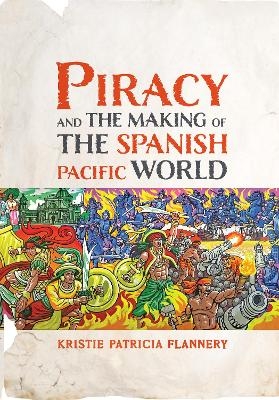
Piracy and the Making of the Spanish Pacific World
Seiten
2024
University of Pennsylvania Press (Verlag)
978-1-5128-2574-9 (ISBN)
University of Pennsylvania Press (Verlag)
978-1-5128-2574-9 (ISBN)
Piracy and the Making of the Spanish Pacific World offers a new interpretation of Spanish colonial rule in the Philippine islands. Drawing on the rich archives of Spain’s Asian empire, Kristie Patricia Flannery reveals that Spanish colonial officials and Catholic missionaries forged alliances with Indigenous Filipinos and Chinese migrant settlers in the Southeast Asian archipelago to wage war against waves of pirates, including massive Chinese pirate fleets, Muslim pirates from the Sulu Zone, and even the British fleet that attacked at the height of the Seven Years’ War. Anti-piracy alliances made Spanish colonial rule resilient to both external shocks and internal revolts that shook the colony to its core.
This revisionist study complicates the assumption that empire was imposed on Filipinos with brute force alone. Rather, anti-piracy also shaped the politics of belonging in the colonial Philippines. Real and imagined pirate threats especially influenced the fate and fortunes of Chinese migrants in the islands. They triggered genocidal massacres of the Chinese at some junctures, and at others facilitated Chinese integration into the Catholic nation as loyal vassals.
Piracy and the Making of the Spanish Pacific World demonstrates that piracy is key to explaining the surprising longevity of Spain’s Asian empire, which, unlike Spanish colonial rule in the Americas, survived the Age of Revolutions and endured almost to the end of the nineteenth century. Moreover, it offers important new insight into piracy’s impact on the trajectory of globalization and European imperial expansion in maritime Asia.
This revisionist study complicates the assumption that empire was imposed on Filipinos with brute force alone. Rather, anti-piracy also shaped the politics of belonging in the colonial Philippines. Real and imagined pirate threats especially influenced the fate and fortunes of Chinese migrants in the islands. They triggered genocidal massacres of the Chinese at some junctures, and at others facilitated Chinese integration into the Catholic nation as loyal vassals.
Piracy and the Making of the Spanish Pacific World demonstrates that piracy is key to explaining the surprising longevity of Spain’s Asian empire, which, unlike Spanish colonial rule in the Americas, survived the Age of Revolutions and endured almost to the end of the nineteenth century. Moreover, it offers important new insight into piracy’s impact on the trajectory of globalization and European imperial expansion in maritime Asia.
Kristie Patricia Flannery is a Research Fellow in the Institute for the Humanities and Social Sciences at Australian Catholic University.
Maritime Violence and Imperial Formation: An Introduction
Chapter 1. Muslim Pirates and Holy War in Philippine Borderlands
Chapter 2. Sea-Robbers and Sangleyes in the Catholic Republic of Manila
Chapter 3. The Pirates from Madras: The British Invasion and Occupation of Manila
Chapter 4. The Loyalist Army and the Great War
Chapter 5. Empire by Expulsion: The Forced Repatriation of Chinese Migrants from the Philippines
Epilogue: Piracy and Empire in the Age of Revolutions and Beyond
Notes
Bibliography
Index
Acknowledgments
| Erscheinungsdatum | 09.04.2024 |
|---|---|
| Reihe/Serie | The Early Modern Americas |
| Zusatzinfo | 9 b/w illus., 3 maps, 2 tables |
| Verlagsort | Pennsylvania |
| Sprache | englisch |
| Maße | 152 x 229 mm |
| Themenwelt | Geisteswissenschaften ► Geschichte ► Allgemeine Geschichte |
| Geisteswissenschaften ► Geschichte ► Regional- / Ländergeschichte | |
| Geschichte ► Teilgebiete der Geschichte ► Wirtschaftsgeschichte | |
| ISBN-10 | 1-5128-2574-3 / 1512825743 |
| ISBN-13 | 978-1-5128-2574-9 / 9781512825749 |
| Zustand | Neuware |
| Haben Sie eine Frage zum Produkt? |
Mehr entdecken
aus dem Bereich
aus dem Bereich


